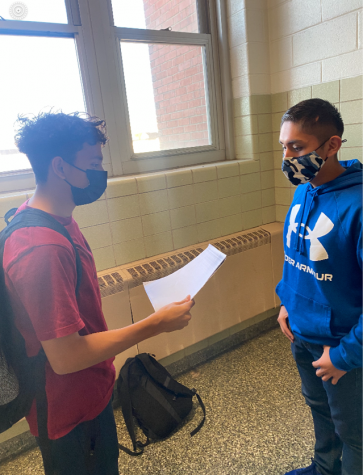Managing Time with Sports
November 10, 2021
Ever wonder how to balance all your obligations as a student-athlete? Athletes can all agree that time management is a huge struggle, especially finding time for family, homework, and sleep. These struggles are completely common, and many athletes go day-to-day handling ineffective managing skills.
Not many athletes are experts at managing time wisely. It’s easy to get caught up in activities and forget about homework that is due the next day.
The Pow Wow interviewed Coach Kaplan of the cross country team and student-athlete Kevin Durand, a member of the Sonderling Top Ten, to learn more about the ways that athletes can get into good habits so they manage their time effectively.

Q: What advice would you give to students who struggle with time management on the team?
Kaplan: If someone on my team were struggling with time management, I would tell them to get into a routine. We end practicing at about the same time every day so they can plan their day out, so you sit down and do schoolwork at the same time every night.
I would also recommend getting ahead of your work if possible. If you wait until the last minute, the work can be overwhelming so the sooner it is completed the more time you will have for other things.
I also know that video games and social media can be distracting so try your best to limit your time or only do it after you finish your work.
Q: What procedures are in place to ensure students put their schoolwork responsibilities before their athletic responsibilities?
Kaplan: On my team, I stress to my athletes that school comes first. We are, especially in high school, student-athletes so being a student first is the most important thing to me. My athletes know that they can go to extra help any day after school if they are struggling. I also am constantly checking up on their academics as well as their progress reports and report cards themselves.
Q: Can you name any students on your team that excel in time management? What do they do well?
Kaplan: I am very fortunate that I have several athletes that manage their time well and I really think they set a good example for the other guys on the team. If I had to pick one, I would say that Kevin Durand is the best at time management.
Kevin is a wonderful student, is a part of several clubs, has a job after school, and never misses practice. I would say that what makes Kevin’s time management great is that he is super organized. He has his whole week planned out and knows exactly what he is doing and when each day. I would say that Kevin is so good he could probably teach me a thing or two about time management.
Q: What makes you avoid procrastination after practice?
Durand: Although after practice I tend to come home tired, I know that there is still a lot of work that I need to do. I make lists of everything I need to do and rank them in priority not necessarily which is due sooner but rather which is more important to me. Sometimes that means that some work gets pushed to the last minute, but it tends to be insignificant work, so it doesn’t bother me as much. It’s easier to get the hard work done first because once you finish it you tend to feel relived, and it makes the rest of the work easier as your brain understands that this isn’t as hard.
Every day I make sure to cross off at least one thing off my list, so this keeps me feeling productive and it becomes a habit so completing work doesn’t become so much of a chore. Although I do still procrastinate on small things I never do so on the important stuff so in the end I always go to sleep knowing I accomplished something even though it may not seem like much it still matters.
Q: What helps you stay on tasks with homework and your sport seasons?
Durand: I do most of my homework on my computer so I put my phone far away from me because I know if I go on it, I will procrastinate for a long time. I also tend to hate leaving something unfinished so once I start something I tend to want to see it through so this helps me complete each task one by one. Although this may sound counterintuitive, I do take short breaks between each work, so once I finish one thing, I may take a short 5-minute break and then get back to work on something new.
Burnout is a real thing and doing straight hours of work wears anyone out and it’s very rare for people that are able to work so long without stopping for a break so taking a short break usually recharges your brain for the next task. It also gives you a chance to clear your mind of it and get ready for whatever is next because most of the time it’s not the same subject, so you need a moment to rewire your brain for that specific task.
It also helps a lot being in a comfortable environment I have my own desk and a nice keyboard for my computer that makes it satisfying to type which helps me work I’ve realized because I’ve also done work in a busy or loud environments and it’s very hard to stay on task with my homework so being in a productive space is also key to staying on task along with removing all the things that easily distract you like your phone.
Now that athletes are returning to their seasons, it is imperative that they begin to settle into good habits. The advice from Kevin Durand and Coach Kaplan will go a long way in ensuring their academic and personal success this school year.



